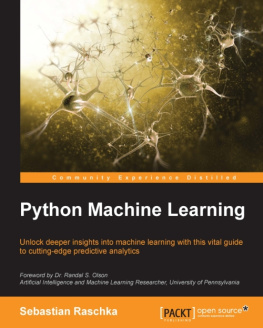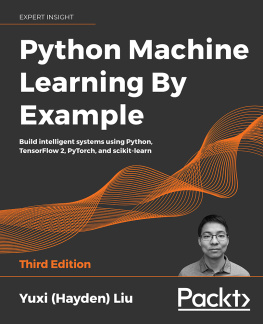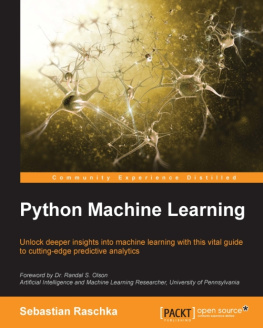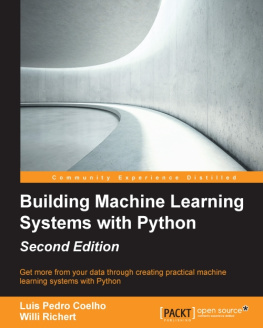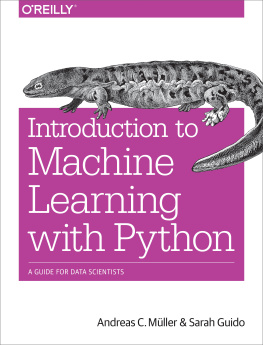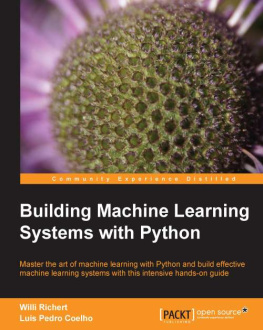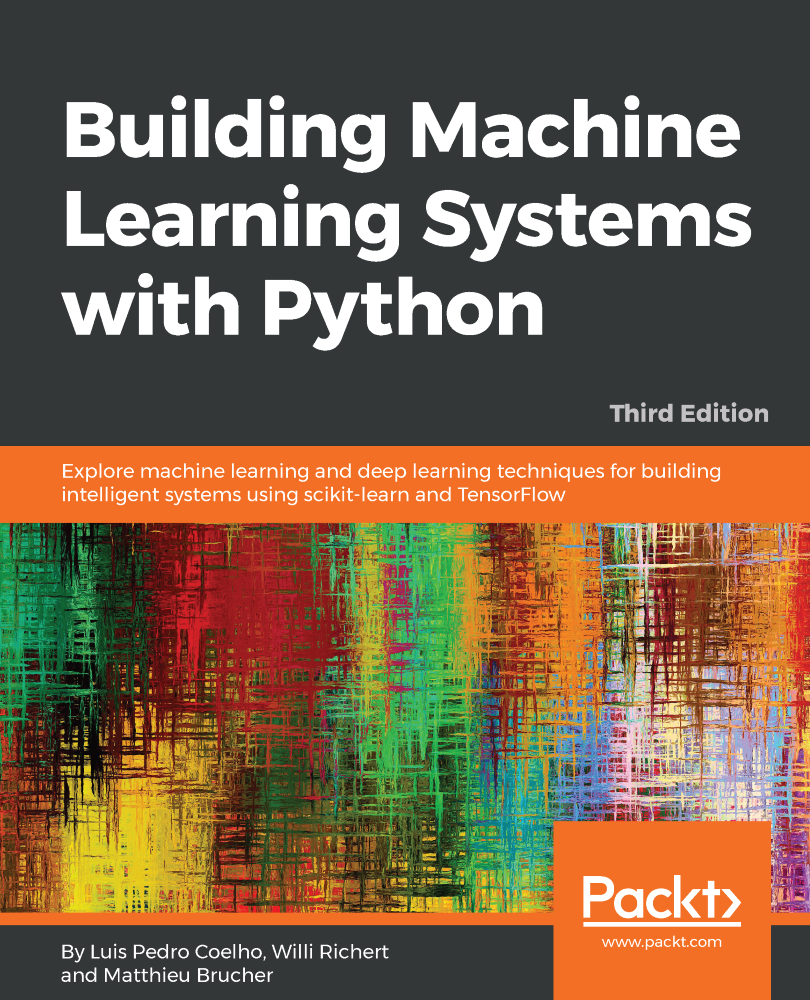
Building Machine Learning Systems with Python
Third Edition
Explore machine learning and deep learning techniques for building intelligent systems using scikit-learn and TensorFlow
Luis Pedro Coelho
Willi Richert
Matthieu Brucher

BIRMINGHAM - MUMBAI
Building Machine Learning Systems with Python Third Edition
Copyright 2018 Packt Publishing
All rights reserved. No part of this book may be reproduced, stored in a retrieval system, or transmitted in any form or by any means, without the prior written permission of the publisher, except in the case of brief quotations embedded in critical articles or reviews.
Every effort has been made in the preparation of this book to ensure the accuracy of the information presented. However, the information contained in this book is sold without warranty, either express or implied. Neither the authors, nor Packt Publishing or its dealers and distributors, will be held liable for any damages caused or alleged to have been caused directly or indirectly by this book.
Packt Publishing has endeavored to provide trademark information about all of the companies and products mentioned in this book by the appropriate use of capitals. However, Packt Publishing cannot guarantee the accuracy of this information.
Commissioning Editor: Sunith Shetty
Acquisition Editor: Divya Poojari
Content Development Editor: Dattatraya More
Technical Editor: Varsha Shivhare
Copy Editor: Safis Editing
Project Coordinator: Shweta H Birwatkar
Proofreader: Safis Editing
Indexer: Aishwarya Gangawane
Graphics: Jisha Chirayil
Production Coordinator: Arvindkumar Gupta
First published: July 2013
Second edition: March 2015
Third edition: July 2018
Production reference: 2280718
Published by Packt Publishing Ltd.
Livery Place
35 Livery Street
Birmingham
B3 2PB, UK.
ISBN 978-1-78862-322-3
www.packtpub.com
mapt.io
Mapt is an online digital library that gives you full access to over 5,000 books and videos, as well as industry leading tools to help you plan your personal development and advance your career. For more information, please visit our website.
Why subscribe?
Spend less time learning and more time coding with practical eBooks and Videos from over 4,000 industry professionals
Improve your learning with Skill Plans built especially for you
Get a free eBook or video every month
Mapt is fully searchable
Copy and paste, print, and bookmark content
PacktPub.com
Did you know that Packt offers eBook versions of every book published, with PDF and ePub files available? You can upgrade to the eBook version at www.PacktPub.com and as a print book customer, you are entitled to a discount on the eBook copy. Get in touch with us at service@packtpub.com for more details.
At www.PacktPub.com , you can also read a collection of free technical articles, sign up for a range of free newsletters, and receive exclusive discounts and offers on Packt books and eBooks.
Contributors
About the authors
Luis Pedro Coelho is a computational biologist who analyzes DNA from microbial communities to characterize their behavior. He has also worked extensively in bioimage informaticsthe application of machine learning techniques for the analysis of images of biological specimens. His main focus is on the processing and integration of large-scale datasets. He has a PhD from Carnegie Mellon University and has authored several scientific publications. In 2004, he began developing in Python and has contributed to several open source libraries. He is currently a faculty member at Fudan University in Shanghai.
Willi Richert has a PhD in machine learning/robotics, where he has used reinforcement learning, hidden Markov models, and Bayesian networks to let heterogeneous robots learn by imitation. Now at Microsoft, he is involved in various machine learning areas, such as deep learning, active learning, or statistical machine translation. Willi started as a child with BASIC on his Commodore 128. Later, he discovered Turbo Pascal, then Java, then C++only to finally arrive at his true love: Python.
Matthieu Brucher is a computer scientist who specializes in high-performance computing and computational modeling and currently works for JPMorgan in their quantitative research branch. He is also the lead developer of Audio ToolKit, a library for real-time audio signal processing. He has a PhD in machine learning and signals processing from the University of Strasbourg, two Master of Science degreesone in digital electronics and signal processing and another in automation from the University of Paris XI and Supelec, as well as a Master of Music degree from Bath Spa University.
About the reviewers
Alberto Boschetti is a data scientist with expertise in signal processing and statistics. He holds a PhD in telecommunication engineering and currently lives and works in London. In his work projects, he faces challenges ranging from NLP, behavioral analysis, and machine learning to deep nets and distributed processing. He is very passionate about his job and always tries to stay updated about the latest developments in data science technologies, attending meet-ups, conferences, and other events.
Gerold Hintz is an applied scientist who specializes in NLP. He obtained an MSc in Computer Science from Darmstadt University of Technology in 2014, focusing on machine learning and minoring in linguistics. He worked as a researcher in the field of computational semantics, applying unsupervised methods to paraphrasing tasks. He likes to study both natural languages and programming languages, and has a particular interest in the intersection of these fields.
Packt is searching for authors like you
If you're interested in becoming an author for Packt, please visit authors.packtpub.com and apply today. We have worked with thousands of developers and tech professionals, just like you, to help them share their insight with the global tech community. You can make a general application, apply for a specific hot topic that we are recruiting an author for, or submit your own idea.
Preface
Machine learning allows models or systems to learn without being explicitly programmed. You will see how to use the best library support available, including, scikit-learn, TensorFlow, and many others, to build efficient, smart systems.
Who this book is for
Building Machine Learning Systems with Python is for data scientists, machine learning developers, and Python developers who want to learn how to build increasingly complex machine learning systems. You will use Python's machine learning capabilities to develop effective solutions. Prior knowledge of Python programming is expected.
Next page

